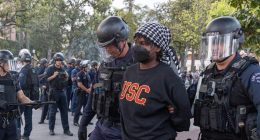
Even before the coronavirus pandemic, life was not as easy as it looked for Julian Sarafian. He was the valedictorian of his high school, a White House intern and a Harvard Law School graduate, but he was also in a yearslong battle with anxiety.
Then, in November of last year, he came down with symptoms of Covid-19, and his girlfriend tested positive for the virus. The illness, on top of his anxiety, months of social isolation and his fear for the safety of his Asian family members, made him depressed.
“It was just kind of the icing on the cake that was, like, the middle finger of 2020,” he said.
Mr. Sarafian, 27, who is from Sacramento, went to therapy a month later, but it was not as simple as making a phone call. He had to explain to his parents, including his Vietnamese mother, the reasons he needed extra care.
After a few months of therapy, he said, he “hit a point where it’s looking a lot brighter than ever before.”
Mental health is heavily stigmatized among Asian Americans, whose older generations, like the older generations of other cultures, tend to see therapy as undignified or a sign of weakness, experts said. But the pandemic and the specter of hate crimes by those who tied the coronavirus to China have prompted a growing number of Asian Americans to overcome the stigma and turn to therapy for help, according to more than a dozen therapists, psychiatrists and psychology professors.
“People were just stuck in their homes with their thoughts and their worries, and there wasn’t an outlet,” said Lia Huynh, a psychotherapist in Milpitas, Calif.
More than 40 percent of Asian Americans were anxious or depressed during the pandemic, up from less than 10 percent before the virus struck, according to the Asian American Psychological Association. The Kaiser Family Foundation found similar rates for all adult Americans, but experts said the figures for Asian Americans were most likely higher than reported because some Asian Americans are uncomfortable talking about mental health.
More than a year and a half into the pandemic, the fear of hate crimes hasn’t decreased for a quarter of Asian adults in the United States. They reported that, in the last few months, they still feared being threatened or physically attacked, according to a poll released this week by NPR, the Robert Wood Johnson Foundation and the Harvard T.H. Chan School of Public Health.
For Jess Stowe, 35, and Terry Wei, 36, Covid was scary enough, but now they worried about being attacked.
“The hate against Asians is more terrifying than the global pandemic,” said Ms. Wei, who is a host of the podcast “unModeling Minorities” with Mrs. Stowe. “I can’t change what people fear.”
That fear was stoked, in part, by President Donald J. Trump’s racist characterizations of the virus, which spread the false narrative that Asian American people were responsible for the pandemic.
A third of Asian Americans surveyed by the Pew Research Center in April said they feared being attacked. Anti-Asian hate crimes in the country’s largest cities skyrocketed 164 percent in the first quarter of this year compared with the first quarter of last year, according to researchers at California State University, San Bernardino. Hate crimes overall increased last year by 2 percent, the researchers said.
Asian Americans, African Americans and Hispanic people tend to see mental health as more stigmatized than European Americans, according to a study published last year in the journal BMC Public Health.
But that view changed for some Asian Americans on March 16, when six Asian women, who were targeted because of their race, were murdered in shootings at spas in the Atlanta area. Asian American communities had talked about anti-Asian violence, but that dialogue became a part of the national conversation after the shootings.
Suddenly, many Asian Americans realized that hate crimes were a life-threatening reality, mental health professionals said.
After a year of dealing with racist microaggressions and health concerns, and enduring a lifetime of institutional racism and mental health stigmas, the shootings were the impetus for many Asian Americans to sign up for therapy.
“It finally broke the stigma open because people were in that much pain,” said Diana Liao, a mental health counselor and psychotherapist in New York.
A Rise in Anti-Asian Attacks
A torrent of hate and violence against people of Asian descent around the United States began last spring, in the early days of the coronavirus pandemic.
-
- Background: Community leaders say the bigotry was fueled by President Donald J. Trump, who frequently used racist language like “Chinese virus” to refer to the coronavirus.
- Data: The New York Times, using media reports from across the country to capture a sense of the rising tide of anti-Asian bias, found more than 110 episodes since March 2020 in which there was clear evidence of race-based hate.
- Underreported Hate Crimes: The tally may be only a sliver of the violence and harassment given the general undercounting of hate crimes, but the broad survey captures the episodes of violence across the country that grew in number amid Mr. Trump’s comments.
- In New York: A wave of xenophobia and violence has been compounded by the economic fallout of the pandemic, which has dealt a severe blow to New York’s Asian-American communities. Many community leaders say racist assaults are being overlooked by the authorities.
- What Happened in Atlanta: Eight people, including six women of Asian descent, were killed in shootings at massage parlors in Atlanta on March 16. A Georgia prosecutor said that the Atlanta-area spa shootings were hate crimes, and that she would pursue the death penalty against the suspect, who has been charged with murder.
Some Asian therapists were inundated with requests from companies and organizations that wanted to host support groups for employees, said Catherine Vuky, a clinical supervisor at South Cove Community Health Center in Boston.
Satsuki Ina, a psychotherapist, said some older Japanese Americans have come to her because the hate crimes evoked memories of when the U.S. government locked them in internment camps during World War II.
Ms. Huynh, the psychotherapist from California, said she has been receiving a lot of calls from patients who are struggling to find a therapist who understands their culture. “People are like, ‘I just want someone that understands that I can’t just talk back to my parents,’” she said.
The mental toll of threats and assaults was challenging for some to balance against the principle of “saving face,” an idea shared among many Asian immigrants that people will gain a bad reputation if they do not maintain their dignity.
Therapy traditionally can be seen in Asian cultures as a way to lose face, said Kevin M. Chun, a psychology professor at the University of San Francisco.
There is also a generational barrier to mental health care, said Doris Chang, an associate professor of psychology at New York University. Younger people are less likely to have an internalized stigma about mental health, and older people are more inclined to think they can resolve their issues without help.
While a new generation of Asian Americans can forge a different conversation about mental health, measures like therapy cannot solve a problem they did not start, said Sherry C. Wang, an associate professor of counseling psychology at Santa Clara University.
“If everybody pitched in to say, ‘Stop anti-Asian hate’ and advocated for Asian American belonging, we would all be safer and healthier and happier,” she said.
Source: Source: NYT






